RPA Development Services for Optimized Business Automation
Transform your business operations with Saasvaap’s cutting-edge RPA (Robotic Process Automation) services. We specialize in designing and deploying intelligent automation solutions that streamline workflows, enhance efficiency, ensure compliance and reduce operational costs. Our expertise extends beyond basic automation; we integrate advanced bot automation and intelligent process automation (IPA) to handle complex processes with precision and agility. Whether you’re looking to optimize existing systems or implement a new automation strategy, our comprehensive RPA consulting services ensure a seamless transition to smarter, more scalable operations.
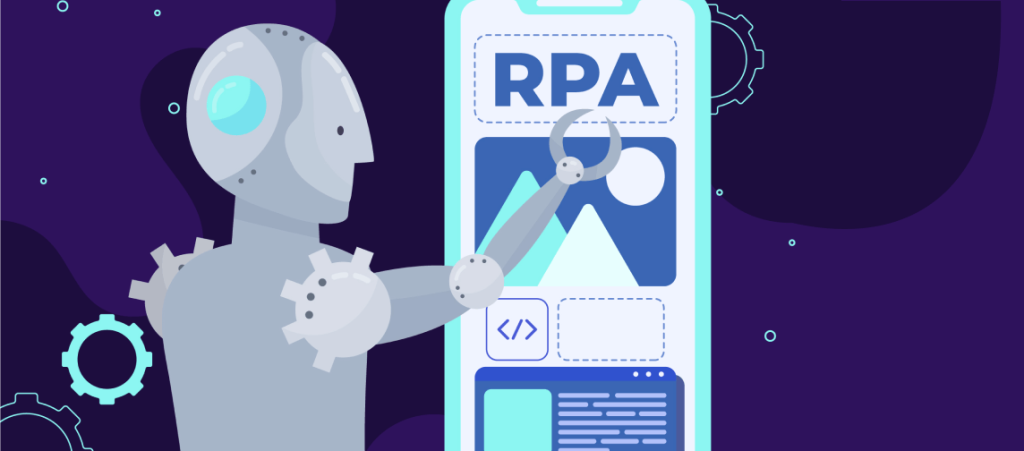
What is Robotic Process Automation (RPA)?
Robotic Process Automation (RPA) is a technology that automates repetitive, rule-based tasks by using software bots to mimic human interactions with digital systems. It enables businesses to streamline workflows, reduce errors, and enhance efficiency without altering existing IT infrastructure. Common applications of RPA include data entry, invoice processing, report generation, and customer onboarding, making it an ideal solution for industries like finance, healthcare, media and advertisements, retail etc.
Key Areas and Applications of Robotic Process Automation (RPA)
RPA bots excel at automating repetitive, rule- based tasks such as data entry, invoice processing, and report generation, freeing up your workforce for higher- value activities.
Advanced Intelligent Process Automation (IPA) capabilities allow RPA to handle complex processes, make decisions, and analyze unstructured data.
RPA tools can be tailored to fit unique workflows, ensuring maximum efficiency and alignment with your business processes.
RPA seamlessly integrates with existing software, databases, and applications without requiring major changes to your IT infrastructure.
Whether you need to automate a single task or scale across multiple departments, RPA adapts to your needs, ensuring flexibility and growth.
Bots work in real-time, enabling quick execution of tasks and immediate access to processed information.
With precise task execution, RPA ensures error-free processes, enhancing operational accuracy and reliability.
RPA maintains detailed logs of all actions, ensuring compliance with industry regulations and audits.
Bots operate round the clock, ensuring continuous productivity and faster response.
RPA Implementation Benefits
Implementing Robotic Process Automation (RPA) brings transformative benefits to businesses, enabling them to optimize operations and stay competitive. Here’s how RPA can make a difference:
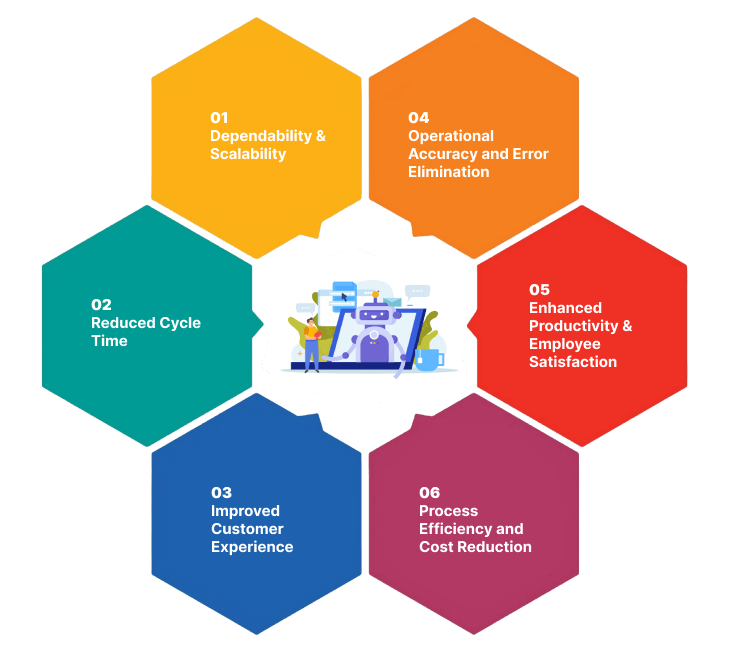
How We Implement RPA for Your Business
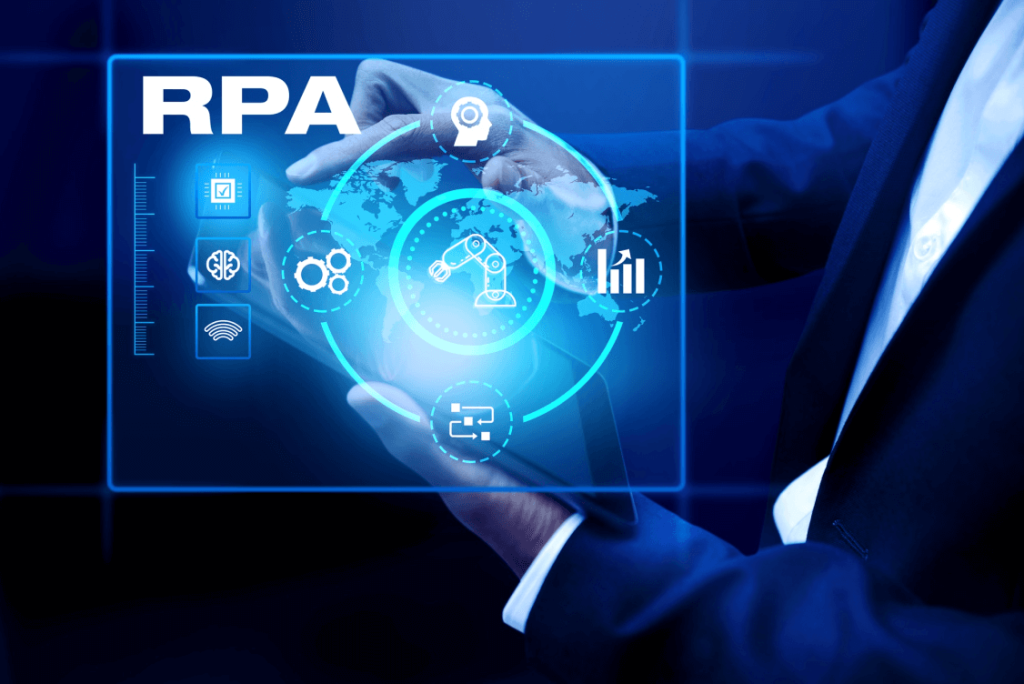
Discovery and Assessment
We conduct an in-depth analysis of your systems to identify repetitive tasks suitable for automation, evaluating workflows, challenges, and integration feasibility. Our approach assesses manual intervention needs, aiming to eliminate them, while a detailed feasibility study ensures optimal RPA opportunities.
Solution Design
We design a tailored RPA strategy aligned with your business goals, selecting the right tools, defining workflows, and outlining implementation scope. This includes solution architecture, process mapping, resource planning, and bot infrastructure setup. We address exceptions, escalations, security, compliance, and scalability to future-proof the solution.
Development and Testing
Our experts create custom RPA bots designed to replicate human actions with precision. Following a 2-week sprint cycle with daily Scrum meetings, we incorporate a detailed Scrum plan to define elements and deliverables. Before deployment, our QA team rigorously tests the bots to ensure they perform accurately and seamlessly within your existing systems.
Implementation and Deployment
We integrate the RPA solution into your workflows with minimal disruption to ongoing operations. The bots are configured and deployed to handle the identified processes, ensuring efficiency from day one.
Training and Support
To help your team adapt to the new system, we provide comprehensive training on managing and monitoring RPA bots. Additionally, our ongoing support ensures your automation solution remains optimized and scalable as your business grows.
Monitoring and Optimisation
We provide two weeks of monitoring, optimizing the system based on feedback from both users and system performance. Key performance indicators (KPIs) are measured to assess goal achievement and ensure alignment with initial objectives, ultimately evaluating whether the expected ROI is met.
Change Management
We document the process thoroughly, outlining the plan and future scope for implementation. If the existing bot is capable of performing the activity, we proceed with it; otherwise, a separate bot is deployed to ensure seamless execution.
Industries We Support
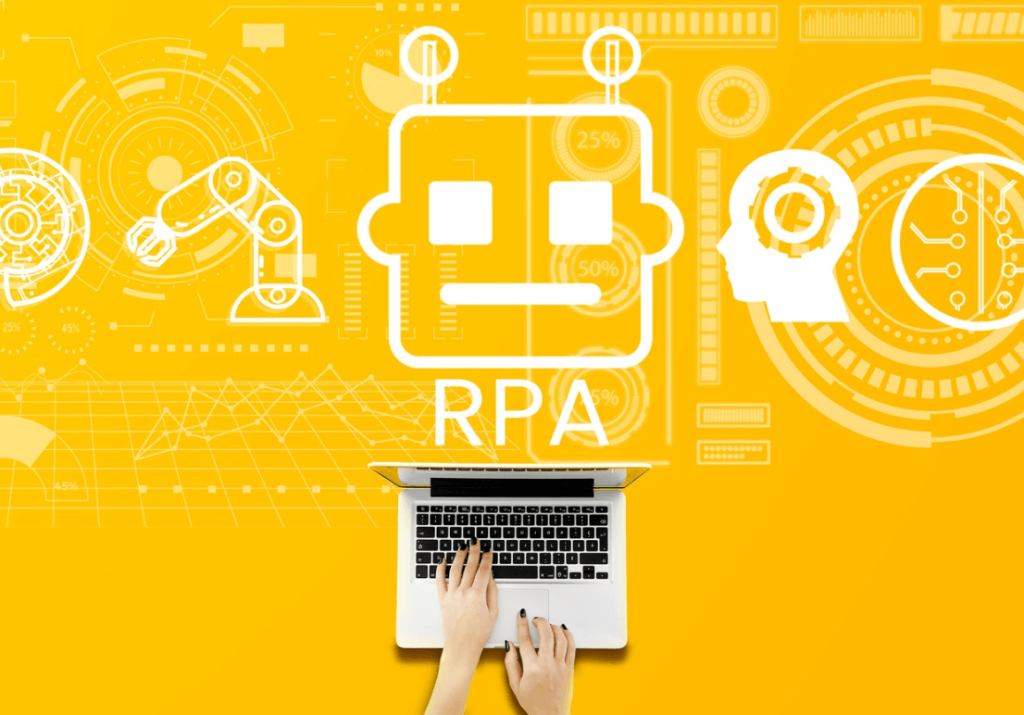
Why is RPA the World’s Fastest-Growing Enterprise Software?
Robotic Process Automation (RPA) has become the world’s fastest-growing enterprise software due to its ability to revolutionize business operations with speed, efficiency, and scalability. By automating repetitive, time-intensive tasks, RPA reduces operational costs, improves accuracy, and accelerates digital transformation across industries. Its seamless integration with legacy systems, combined with advanced features like Intelligent Process Automation (IPA) and machine learning, makes it an adaptable solution for dynamic business needs. With benefits such as improved productivity, enhanced customer experiences, and compliance readiness, RPA empowers organizations to stay competitive in a technology-driven marketplace. This unmatched versatility and ROI potential have made RPA a critical driver of global enterprise innovation.
RPA and Intelligent Process Automation
Robotic Process Automation (RPA) and Intelligent Process Automation (IPA) work together to enhance business efficiency. While RPA automates repetitive, rule-based tasks, IPA integrates advanced technologies like artificial intelligence (AI) and machine learning (ML) to handle unstructured data and make intelligent decisions.
This connection allows businesses to move beyond basic automation to more advanced solutions, such as analyzing customer feedback, detecting fraud, or optimizing workflows. To learn more about how Intelligent Process Automation can transform your business, visit our IPA Solutions page.
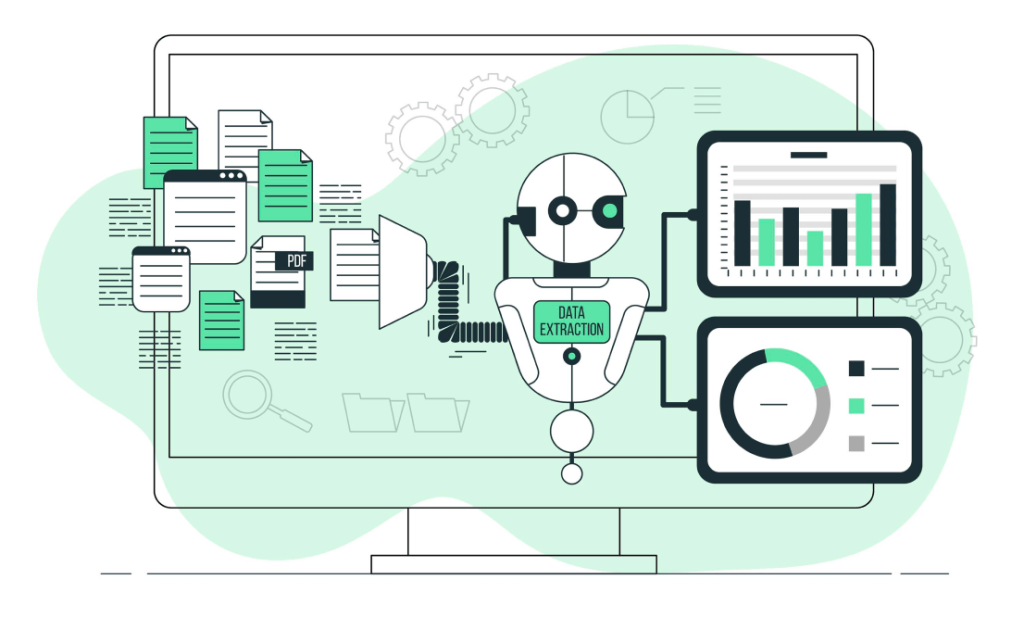
FAQ
What are RPA services?
RPA services help businesses automate routine tasks using software robots that handle repetitive work.
What does an RPA consultant do?
An RPA consultant guides companies in selecting, designing, and implementing automation solutions to improve efficiency.
What is RPA process development?
RPA process development involves creating automated workflows that allow software robots to perform tasks normally done by humans.
How does Robotic Process Automation work?
RPA uses software robots to mimic human actions on computers, automating repetitive tasks like data entry or moving files between systems.
Does this platform require coding?
Most RPA platforms are low-code, meaning you don’t need much coding knowledge to use them, but some advanced tasks may require programming skills.
Which processes can be automated with this platform?
Any repetitive, rule-based processes like data entry, invoice processing, or report generation can be automated with RPA.
What are AI and ML, and how do they help in automation?
AI (Artificial Intelligence) and ML (Machine Learning) help automation systems make smarter decisions by learning from data and adapting over time.
What tasks can RPA automate?
RPA can automate tasks like filling out forms, transferring data between systems, generating reports, and managing emails.
What are the benefits of implementing RPA in an organization?
RPA increases efficiency, reduces human error, saves time, and lowers costs by automating repetitive tasks.
Can you give examples of RPA use cases?
Examples include automating customer support tasks, processing invoices in finance, managing HR onboarding, and handling IT service desk requests.
Is RPA Very Expensive?
The cost of RPA depends on process complexity, scale, and tool selection. While there’s an initial investment, RPA can drive long-term savings by improving efficiency, reducing errors, and cutting operational costs.
Is It Difficult to Implement and Maintain RPA?
RPA implementation can be straightforward with the right approach. Saasvaap guides you through every step, ensuring easy integration, tailored solutions, and ongoing support for seamless maintenance and updates.
Who Can Help Me with RPA?
Saasvaap is an expert RPA agency offering end-to-end solutions, from process assessment and strategy design to bot deployment and ongoing support, helping businesses maximize the value of RPA technology.
Is RPA the Same as AI?
No, Robotic Process Automation (RPA) and Artificial Intelligence (AI) are distinct technologies, though they often complement each other. RPA focuses on automating repetitive, rule-based tasks by mimicking human actions within digital systems, such as data entry or invoice processing. It follows predefined rules and workflows, making it ideal for structured tasks.
In contrast, AI enables systems to simulate human intelligence by learning, reasoning, and making decisions. AI can analyze unstructured data, recognize patterns, and predict outcomes, which RPA alone cannot achieve. When combined, RPA and AI create Intelligent Process Automation (IPA), allowing businesses to automate both structured and unstructured processes, delivering enhanced efficiency and decision-making capabilities.
Discover More About our Process Automation Solutions
Feel free to call us directly or drop a message for more details on our RPA Solutions.
